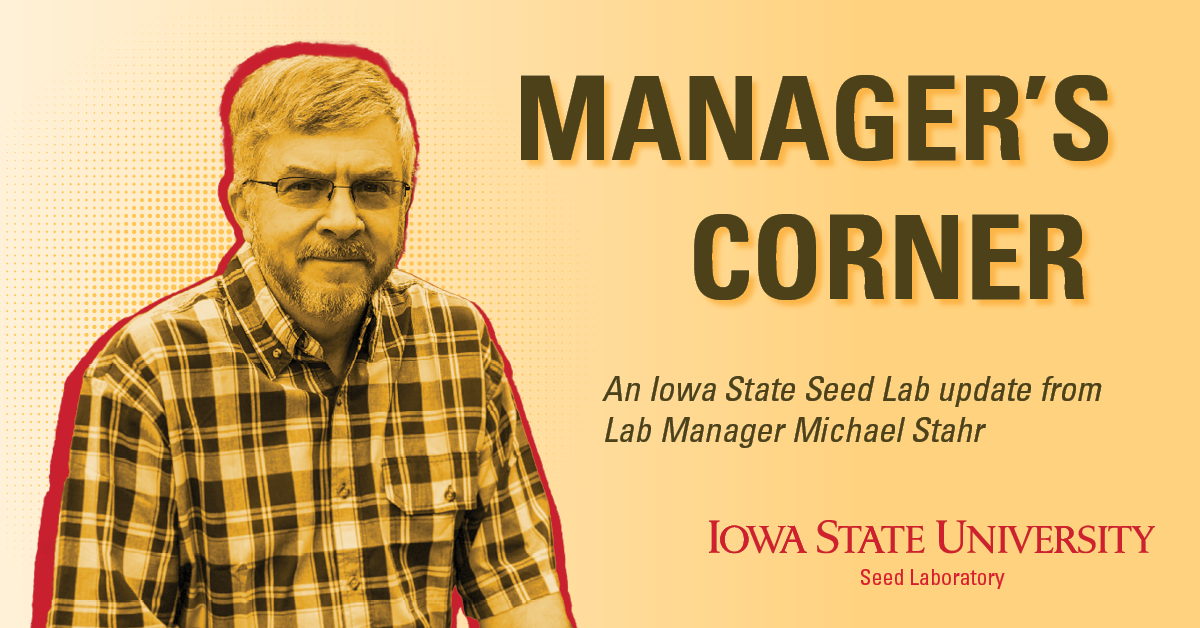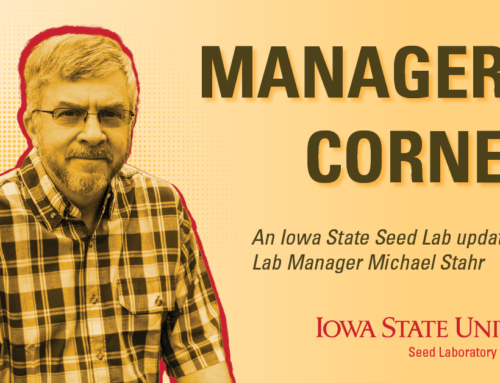The holiday season coincides with a busy time for staff, temp and student workers at the ISU Seed Lab as it also coincides with a busy time for many of our customers. I have had the pleasure of working at the Seed Lab for ~40 years, if my two years as a student worker are included. Years ago we had two slower times of the year: late spring into the summer and the month of September. That changed a few years later when our summers included many samples of flower and vegetable seeds. Even though we are based in corn and soybean country, we test over 300 species of seeds, including grasses, small-seeded legumes, flower, vegetables and even cotton & peanuts!
August & September 2018 and 2019 were different as we tested many samples of rye seeds and oat seeds for use by farmers as cover crops. That testing is either for a farmer to meet NRCS requirements (purity, germination, from which Pure Live Seed can be calculated) or for farmers and seed companies wishing to sell to farmers (purity, noxious, germination). Testing has to be done in a timely manner because many farmers seed from the air and they have seedling dates locked in. Fortunately, the rye samples (for the most part) didn’t have a problem with Fusarium, but unfortunately, some of the oat samples were pretty dirty (a lot of inert matter). The dirtier the sample with weed seeds and inert matter, the longer it takes to process and the more expensive it is for the customer.
As of October 28, we switched all testing to our new seed testing database CySeed (Go Cyclones!). Health testing switched in late June. There have been some bumps and for that I apologize to our customers who we affected. CySeed offers many advantages for both our staff and our customers. We have greatly improved search capabilities, increased options to receive information about samples and also the ability to connect Excel spreadsheets, images and instrument-generated reports with samples. We continue to offer secure web locker accounts, accessible 24 hours a day, in which reports can be printed, results checked and testing progress tracked. To have an account set up please contact me at mgstahr@iastate.edu and provide your account number and a password of your choosing. Another option which is available for qualifying accounts is e-transfer. E-Transfer uploads customer and sample information directly into CySeed. This is especially helpful when variety, lot or information consists of long strings of letters and numbers. Please contact Cherie or myself (seedlab@iastate.edu, 515-294-6826) anytime you have a question or a comment.
This will be an even busier year than normal for workshops. In late January we will conduct Purity Week of the Seed Analyst Short Course. In the past it has been held the week before or after Germination week. Purity week has received rave reviews the past two years as RST Jessica Blake has done a great job organizing and teaching a course that focuses on participants not only getting lots of hands-on time, but also getting much “how to” information from Jessica, other instructors and other students. The first week of February we will host the SCST Genetic Testing Super Workshop. Germination week will be the last week of April with the AOSA SCST Germination exam April 30 and the Purity exam May 4. From there we go to a summer of seed conditioning workshops organized by our colleague Alan Gaul. Please check the Training page for more information.
As always, we very much appreciate our customers!
Mike
Whom do I contact at the ISU Seed Lab?
The cheery voice you hear when calling 515-294-6821 is likely to be Cherie Hill, but it could be Connie or Morgan. To contact ISU Seed Lab Customer Care by e-mail: seedlab@iastate.edu.
Lab Manager Mike Stahr: mgstahr@iastate.edu (best way to contact me) or 515-294-6826
ISU Seed Lab website: www.seedlab.iastate.edu
ISU Seed Science Center website: www.seeds.iastate.edu


